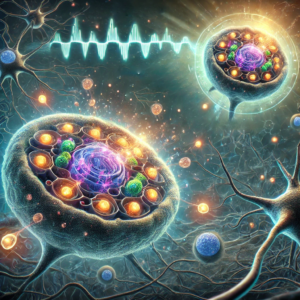Short-Term Rapamycin Treatment Boosts Lifespan and Healthspan in Mice

Scientists studying the transient rapamycin treatment research data.
- Three months of rapamycin treatment increases life expectancy by 60% in middle-aged mice. For mice, middle age is from 12-18 months (40-60 in human years).
- Scientists notice considerable improvements in healthspan
- Changes in gut health were noted, especially an increase in beneficial (friendly) bacteria
- Treatment showed distinct effects on different cancers in female mice
Introduction: Dirt Drug Boosts Lifespan 60% in Mice
The FDA approved rapamycin, a special compound found in soil, over 20 years ago. The drug’s full potential is still unknown, hence the continual research. In this study, middle-aged mice were treated with Rapa for only 3 months (90 days). The treatment groups were 600 days old, which equates to 50+ human years. The trial saw an incredible 60% boost in lifespan and healthspan. These results may lead to treatments that could completely change the way humans approach healthy aging.

The Science Behind Rapamycin Treatment
Scientists are still trying to figure out how rapamycin might help us all live longer. The most agreed-upon theory is the way it influences our cells’ own cleaning system, called autophagy. Think of autophagy as a trash collector. It’s a process that removes damaged bits and junk away from cells. Rapamycin seems to turn up this natural cleaning process. Cell cleaning helps prevent the build-up of cellular garbage that comes with aging.
There’s more. In these experiments, researchers looked at four specific areas.
- Lifespan Extension
- Healthspan Improvements
- Impact on Cancer Incidence
- Gut Microbiome Effects
#1 Lifespan Extension in Mice
Researchers gave rapamycin to male and female mice for three months straight. They controlled the amount at 8 mg/kg per day. Because lab mice weigh between 20-30g, the Rapa dosage was only a fraction of a milligram. The aim was to observe and analyze the effects on lifespan, plus health markers and gut bacteria.
Male Mice
The study found that male mice on Rapa lived significantly longer than those that had none. Rapamycin treatment extended life expectancy by almost two-thirds. Not only did the treated mice live longer, but this effect continued even after the treatment ended. These positive benefits held true even considering all-cause mortality (including non-age-related deaths).
Rapamycin is just one of many approaches being explored to promote healthy aging. Some of the others are dietary changes, exercise, and the taking of certain supplements. On its own, rapamycin is proving to be a powerful, natural drug. Its advantage is the ability to target the way cells work with aging. Despite Rapa’s huge potential, it’s still a drug, and that means some people may experience adverse reactions. Side effects are much less of an issue with lifestyle changes, i.e., diet and exercise, of course.
Female Mice
The food intake was the same for all groups of mice. Despite that, unlike the male group, Rapa-treated female mice did not show any notable increase in lifespan. One of the reasons was the differential impact on types of cancer in female mice (see next).
Healthspan Results Differ Between Sexes
This study was not only about how rapamycin treatment affected lifespan but also healthspan. Healthspan is how long you live in good health, while lifespan is how long you live. In this trial, the healthspan outcomes showed different results between the sexes.
Impact on Cancer Incidence
Rapamycin treatment led to changes in cancer occurrence, particularly in female mice. Rapa-injected females showed a decrease in solid tumors (non-hematopoietic cancers). In contrast, scientists saw an increase in aggressive blood (hematopoietic) cancers. Males had a similar rise in hematopoietic cancers but with better healthspan outcomes. These findings tell us that rapamycin affects cancer types differently based on sex.
Beyond Lifespan: Rapamycin and Metabolism
The study looked into how rapamycin affects the ways mice use sugar and store body fat. The treated mice handled sugar and burned it for energy better than the control group. That suggests Rapa may help prevent age-related blood sugar issues like diabetes. This study also saw beneficial changes in how the treated group processed body fat. Improvements in how the body handles fat could lead to treating obesity-related diseases. This is one more study showing rapamycin’s growing list of possible benefits other than healthy aging.
Rapamycin Treatment Effects on Gut Microbiome
Inside every tummy lives a huge family of tiny organisms, mostly bacteria. The scientific term for this community is “gut microbiome.” The job of these trillions of organisms is to help digest food and keep you healthy. This study revealed another fascinating finding on Rapa’s impact on the gut microbiome.
Changes in Gut Microbiota
Poop samples taken from the treated group were different from the regular group. Rapa-treated mice showed a dramatic increase in the number of bacteria found in their small intestines. Scientists link this shift in microbial makeup to improved health outcomes.
Implications for Future Research
The results of this rapamycin treatment study in mice are promising for the most part. But, it hasn’t concluded Rapa’s optimal dosages and durations. Another area needing more investigation is the sex-specific differences noted in the tests. Scientists are hopeful of developing strategies for improving lifespan and healthspan in humans.
Further studies will help clarify optimal dosages and durations of Rapa treatments. But first, we need to see if the benefits seen in mice translate to humans. Another uncertainty is what potentially unknown side effects might exist. Also, understanding sex-specific effects is vital for developing safe and effective treatments. Experts tend to agree that Rapa’s future looks promising but as one part of a healthy aging toolkit.

In Conclusion
This study offers compelling evidence of the benefits of short-term rapamycin treatment. It showed long-lasting effects on lifespan and healthspan in lab mice. The study also saw sex-based differences in how Rapa affects cancer and the gut microbiome.
Resource links
Transient Rapamycin Treatment Can Increase Lifespan and Healthspan in Middle-Aged Mice




